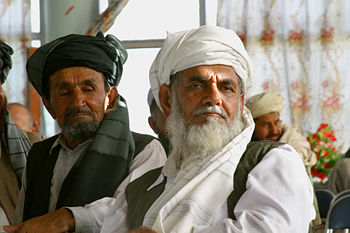Pashtun people
Pashtuns (also known as Pakhtuns, Pathans) are an Eastern Iranian group primarily located in Southern Afghanistan, in the North-West Frontier Province, Federally Administered Tribal Areas and Balochistan provinces of western Pakistan. The Pashtuns primarily speak the Pashto language, although a Dari speaking minority exists. Dari, however, is the lingua franca of Afghanistan.
Background
History
Pashtunwali
Tribes and clans
The two main tribes of the Afghans are the Ghilzai and the Durranis. Traditionally, the Durranis have controlled Afghanistan's political affairs, although the Ghilzai are the majority. In fact, Afghanistan's monarchy was founded by Ahmad Shah Durrani in 1747. The other important tribal groups are the Jaji, Mangal, Safi, Mamund, and Mohmand.
The Durranis are dominated by two main clans, the Zirak and the Panjpia. The Zirak have historically been the elite, and the Afghan royal family came from the Mohamedzai subclan of the Ziraks. Afghan President Hamid Karzai is from the Popalzai subclan of the Ziraks. The Panjpia subclans include the Alizaj, Izhak, Koginaj, Maku, and Nurzai.[1]
The Ghilzais have been well known for their bravery and chivalry for many centuries. They are believed to be descended Khilji Turks by most historians. Traditional historians are however of a different view. According to them, Ghilji and Lodi/Lodhi (Ibrahim Lodhi) were the offspring of Shah Hussain Ghauri off his first wife; Bibi Mato bint Bait Nikka bin Qais Abdul Rashid. According to O'Connel Jr, The Ghilzai are the descendents of the Wu'chi (Indo-European/Turk) which absorbed the remnants of the Tocharian people (Indo-European) after the fall of the Tarim Basin to the Han Chinese.[2]. Important Ghilzai clans include the Lodi, Suleiman Khel, Nasir Khel, Hotak, and Kharotis.
Elders play important roles in the clans and all important decisions are influenced by them.
Demography
Notes and References
- ↑ Lansford, Tom - A Bitter Harvest: Us Foreign Policy and Afghanistan, pages 16-17, ISBN 0754636151
- ↑ Khyber.org - Ghilzai

